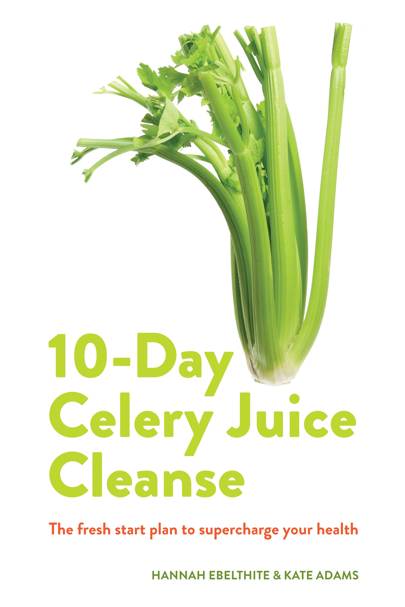The last firework has gone off, you’ve clinked the final glass of champagne and if you’re anything like us, you’re body will be made up of 60% beige food and 40% cocktails. January has officially arrived and it’s time to pay the price for our indulgent festivities.
Amongst the many fads and health hacks being encouraged this January, many will be turning to the ever-popular celery juice cleanse. But does it actually work? And is it genuinely beneficial for you? Hannah Ebeltithe, author of 10-day Celery Juice Cleanse: The fresh start plan to supercharge your health, investigates…

What’s the lowdown on the nutritional benefits?
Until recently, celery might not have been on your nutrition radar. It’s certainly not been at the top of any superfood charts. But that’s perhaps unfair because these humble green sticks pack a whole bunch of goodness. We all know how important it is to consume more vegetables and fruit, with five a day a recommended minimum. Munching on just one and a half full-length celery sticks counts as one portion towards your daily quota. With nutrition and environmental experts worldwide extolling the benefits of a more plant-based diet, we should all be expanding our vegetable repertoire.
Like all veggies, celery is very low in calories, fat and cholesterol. It has a high water and electrolyte content, at least 90 per cent, so it is hydrating, too. It’s a low-carbohydrate food but still a decent source of fibre (if that’s not removed by juicing), so it supports healthy digestion and may aid weight loss. In fact, celery is one of the very best sources of prebiotic fibre, which is the food which trillions of friendly microbes in our gut need to thrive and multiply. Gut health is one of the most researched and exciting areas of medicine at the moment, with new evidence constantly emerging to suggest that an abundant and diverse microbiome means better overall physical and mental health as well as a reduced risk of a whole host of conditions.
Eating celery provides you with a good range of vitamins, minerals and antioxidants, including vitamins K, A, B6 and C, folate, riboflavin, potassium, manganese, calcium and magnesium.
It’s a good source of beneficial enzymes and contains compounds that help it act as a diuretic and reduce water retention and bloating. Its phytonutrients also include flavonoids and polyphenols, which have linked the vegetable to better liver, eye, skin and cognitive health.
A zero-waste food, you can enjoy every part of a celery plant – sticks, leaves, seeds, even the root (as in celeriac, a related plant). And it’s one of the most versatile vegetables as you can have it raw, in salads and crudités, juiced or blended into smoothies and soups, steamed as a side dish or added to countless cooked dishes such as risottos, sauces, ragùs and stews. Celery seeds can be bought whole, crushed or ground and used as a spice or salt – the distinctive flavour comes from the oily compound, apiol, contained in the vegetable.
If you’re trying to lose weight or maintain your healthy weight, raw celery is an excellent addition to your daily diet. Studies have shown foods with a satisfying crunch help you to feel fuller for longer. Munching on some celery sticks can easily become a mindful-eating exercise that really helps you enjoy its flavour and texture as well as appreciate its goodness. As a sustaining and delicious snack, try dipping celery sticks in some nut butter or houmous for an extra hit of protein and healthy fats. Caution: celery is among a small group of foods that can cause potentially fatal anaphylactic shock in susceptible people (similar to a peanut allergy). If you have food allergies it’s worth speaking to your doctor or a dietitian to establish risk.
What are the ‘healing effect’ claims?
Members of the ‘celery juice movement’ claim it has profound healing effects that can change the lives of those battling chronic illness. The list of conditions it’s been claimed a daily juice can help is lengthy, ranging from chronic fatigue syndrome (CFS/ME) to eczema, fibromyalgia to psoriasis and even cancer. The fact these claims have yet to be substantiated isn’t of concern to Williams, who simply says that science hasn’t got there yet. His source, he insists, is ‘the spirit’ who communicates with him. His proof? The thousands of supporters who confirm the positive effects on their own health. ‘Celery juice is not easy to make and it doesn’t taste very good, so for it to thrive to this degree is testament,’ he has said.
The Medical Medium website says celery juice is saving lives as it restores people’s health, one symptom at a time. It claims the juice can:
• Heal the gut and relieve digestive disorders
• Balance blood sugar, blood pressure, weight and adrenal function
• Neutralize and flush toxins from the liver and brain
• Provide the brain with electrolyte support to counter disease
• Treat a vast range of chronic and mystery illnesses, including fatigue, brain fog, acne, eczema, addiction, attention deficit hyperactivity disorder (ADHD), thyroid disorders, diabetes, small intestinal bacterial overgrowth (SIBO), eating disorders, autoimmune disorders, Lyme disease and eye problems
As a digestive aid, celery juice is claimed to be a natural laxative, to reduce inflammation in the gut and to increase absorption of other nutrients in your diet. It’s said to contain enzymes that raise levels of hydrochloric acid in your stomach to aid digestion and prevent fermentation in the gut and therefore bloating. And those who believe in an alkaline diet say celery juice helps to alkalinize the gut. Many of the effects Williams puts down to his claim that celery contains substances called cluster salts, an ‘undiscovered’ subgroup of salt, that kill off pathogens like bacteria and viruses. Williams’ protocol is to drink 16oz (473ml or almost 1 pint) of pure celery juice every morning on an empty stomach, then wait 15 minutes before eating any other food. If you really don’t like the taste or find the amount hard to ingest, he concedes that you can add an apple or some cucumber, and start with half the amount. But the goal is to phase out additional ingredients and build up to the full dose of pure celery.
Are there any studies into the health benefits?
The long list of claims made by the Medical Medium and other advocates on social media suggests celery juice is nothing short of a miracle. But what does the science really say?
First, we must acknowledge that facts about dietary discoveries are rarely as simple as headlines might promise. Research into the effects of a single food is notoriously hard to carry out. It’s incredibly difficult to analyse how one small element of our diet affects our health as a whole. Why? Well, human cohort studies that rely on accurate self-reporting are notoriously flawed. And, of course, there are many other confounding factors that could skew results, such as the rest of a person’s complex diet, their exercise and lifestyle habits or existing health conditions, to name just a few.
As such, many of the scientific studies behind the headlines – for all foods, not just celery – will have been performed in more controlled conditions on animals. Or even using isolated compounds from food in Petri dishes. In other words, we can only guess that the findings can be extrapolated to real people eating real food in varying quantities.
Of course, that’s not to say that any findings are nonsense. We can think of them as valuable first steps. Absence of proof is not proof of absence and, as with many nutritional and complementary therapies, thousands of years of anecdotal evidence is what convinces many people that there are real health benefits to be had. But let’s look at the existing science for the moment.
What will celery juice offer us?
HEART HEALTH BENEFITS
Celery contains antioxidants and has been shown in pharmacological studies to demonstrate activity that may help reduce blood pressure and cholesterol levels, lowering heart disease risk – although the blood pressure reduction does seem to come from the seeds rather than the sticks.
ANTI-INFLAMMATORY PROPERTIES
Celery is high in antioxidant flavones and polyphenols, which are known to have an anti-inflammatory effect.
NEUROGENESIS
The apigenin in celery is also thought to stimulate neurogenesis (growth and development of nerve cells). A 2009 mice study found it improved learning and memory.
PROTECTS LIVER HEALTH
Researchers found that supplementing a high cholesterol diet with celery and chicory leaves and barley powder saw improvements in liver enzyme ffunction and lipid levels.
REDUCES BLOATING AND BOOSTS DIGESTION
Bloating in this instance means water retention (rather than gas) and this effect comes from the same diuretic properties that also make celery useful for high blood pressure. In terms of digestion, effects may vary. Increasing fibre intake may be useful for some people and not others. Celery is a high FODMAP food (it contains mannitol) – FODMAPs are compounds thought to trigger digestive problems – so may worsen bloating and other digestive issues in those with IBS.
FIGHTS INFECTION
Studies confirm the traditional use of celery seeds to boost immunity and fight infection.
ULCER AND CANCER PROTECTIVE
A 2010 study published in the Journal of Pharmaceutical Biology identifies a type of ethanol extract found in celery that can replenish gastric mucus in the digestive tract, protecting against ulcers. our skin, hair, nails, energy levels, or improvements in blood pressure or any inflammatory conditions you suffer from. And it’s worth remembering that there are lots of other green vegetables that offer similar or greater benefits, such as broccoli, kale, and wheatgrass.
10-day Celery Juice Cleanse: The fresh start plan to supercharge your health by Hannah Ebeltithe is published by Aster, January 2020, www.octopusbooks.co.uk
